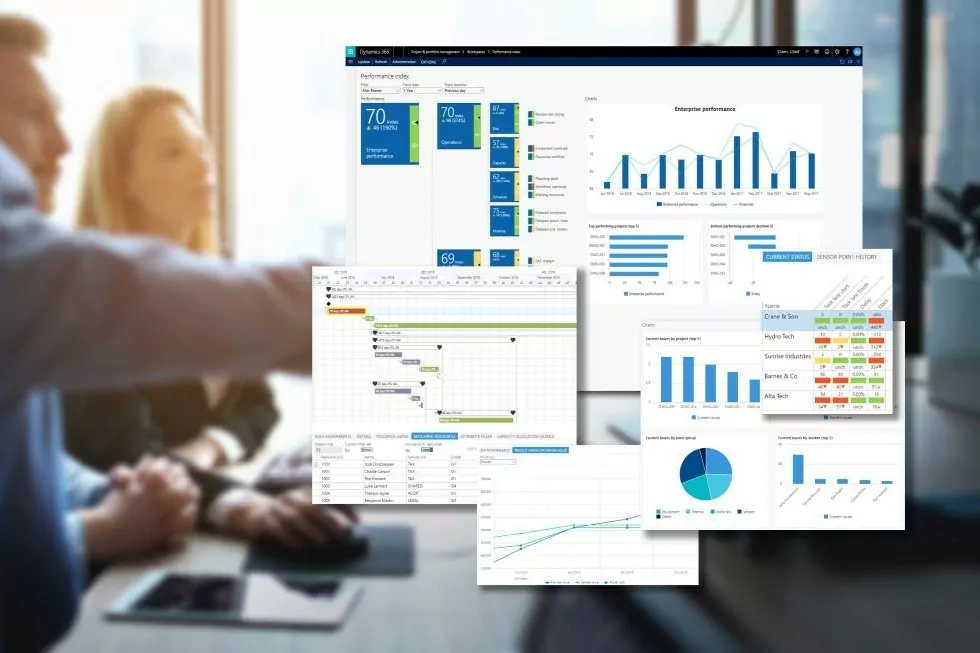
Enterprise project management software refers to a comprehensive suite of tools and applications designed to help businesses plan, organize, execute, and monitor projects efficiently. This software provides a centralized platform for project managers, team members, and stakeholders to collaborate, track progress, allocate resources, manage budgets, and ensure project deliverables are met within defined timelines. It enables organizations to streamline their project management processes, improve communication, enhance visibility, and make data-driven decisions.
There are many project management tools on the market. Find a short list below:
All of these tools offer standard project management capabilities. However, none of them offer a complete project business system covering what an enterprise needs.
If you are part of a large enterprise, you may think you are looking for a project management tool, but what you are really looking for is a project business system.
If you are part of a large enterprise, you may think you are looking for a project management tool, but what you are really looking for is a project business system. Project business systems are comprehensive solutions that address all the financial and operational processes that are required to manage projects in an enterprise. These systems are meant to serve the needs of project business.
In today’s fast-paced business environment, effective project management is vital for enterprises looking to optimize their operations, increase efficiency, and achieve successful outcomes. Enterprise project management software plays a crucial role in empowering organizations to plan, execute, and control projects effectively.
However, as technology continues to advance, a new solution has emerged that takes project management to a whole new level of productivity and automation: Project Business Automation (PBA). In this article, we explore the concept of enterprise project management software, its benefits, and why PBA is the ultimate solution for enterprises seeking to streamline their project management processes.
While traditional enterprise project management software has been a staple in the industry, it has certain limitations that hinder its ability to fully address the complex challenges faced by modern enterprises. Some of these limitations include:
Siloed Approach: Traditional project management software often functions as isolated tools, leading to information silos and fragmented communication between teams and departments. This can result in a lack of transparency and coordination, leading to delays, errors, and misalignment.
Manual Processes: Many traditional software solutions rely heavily on manual data entry, updates, and reporting. This not only consumes valuable time but also increases the risk of human error and makes it challenging to maintain accurate, up-to-date project information.
Lack of Integration: Traditional project management software may lack integration capabilities with other critical enterprise systems, such as customer relationship management (CRM), enterprise resource planning (ERP), and financial management systems. This limits the ability to leverage a holistic view of project data and impacts decision-making.
Limited Automation: While some level of automation exists in traditional software, it often falls short in automating complex project workflows, repetitive tasks, and approval processes. This results in increased manual effort, decreased productivity, and missed opportunities for optimization.
Project Business Automation (PBA) represents a significant advancement in the realm of project management, offering a comprehensive solution that addresses the limitations of traditional software. PBA combines project management capabilities with business process automation, enabling organizations to streamline and optimize their project-centric business processes.
End-to-End Automation: PBA leverages advanced automation technologies to automate routine tasks, data entry, and complex workflows. This significantly reduces manual effort, improves accuracy, and enhances productivity across the project lifecycle.
Integration and Collaboration: PBA seamlessly integrates with other critical enterprise systems, such as CRM, ERP, and financial management, providing a unified view of project and business data. This integration enhances collaboration, data sharing, and enables stakeholders to make informed decisions based on real-time insights.
Enhanced Visibility and Control: PBA offers comprehensive dashboards and reporting capabilities, providing real-time visibility into project progress, resource utilization, budgeting, and key performance indicators. This empowers project managers and executives with the information they need to proactively manage projects and drive strategic decision-making.
Find the Project Management Software that is best for your business. Try one of these tools and get started today!
ETO Software is a broad term that could be referred to different applications, namely either Engineer-to-Order (ETO) software or Efforts…
Clarizen was a collaborative work management software that was acquired by Planview.
EcoSys by Hexagon is a comprehensive Enterprise Project Performance (EPP) platform designed to provide control, efficiency, and profitability of projects.
Kantata is a cloud-based Professional Services Automation (PSA) solution specifically designed for agencies, professional services organizations, and consultants.
Planisware is a provider of cloud-based enterprise project portfolio management (PPM) software. Planisware Enterprise is its flagship product.
This website uses cookies.